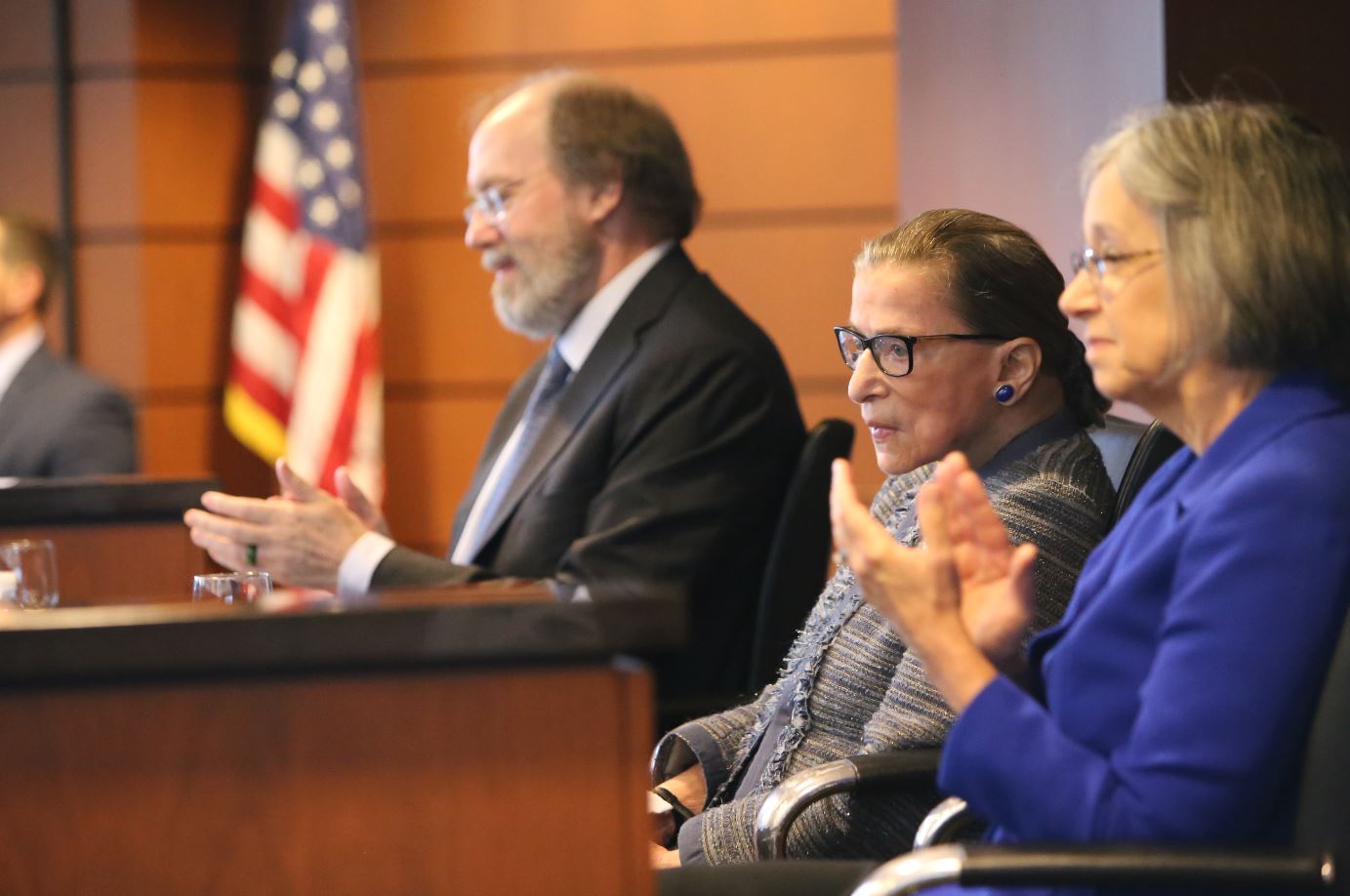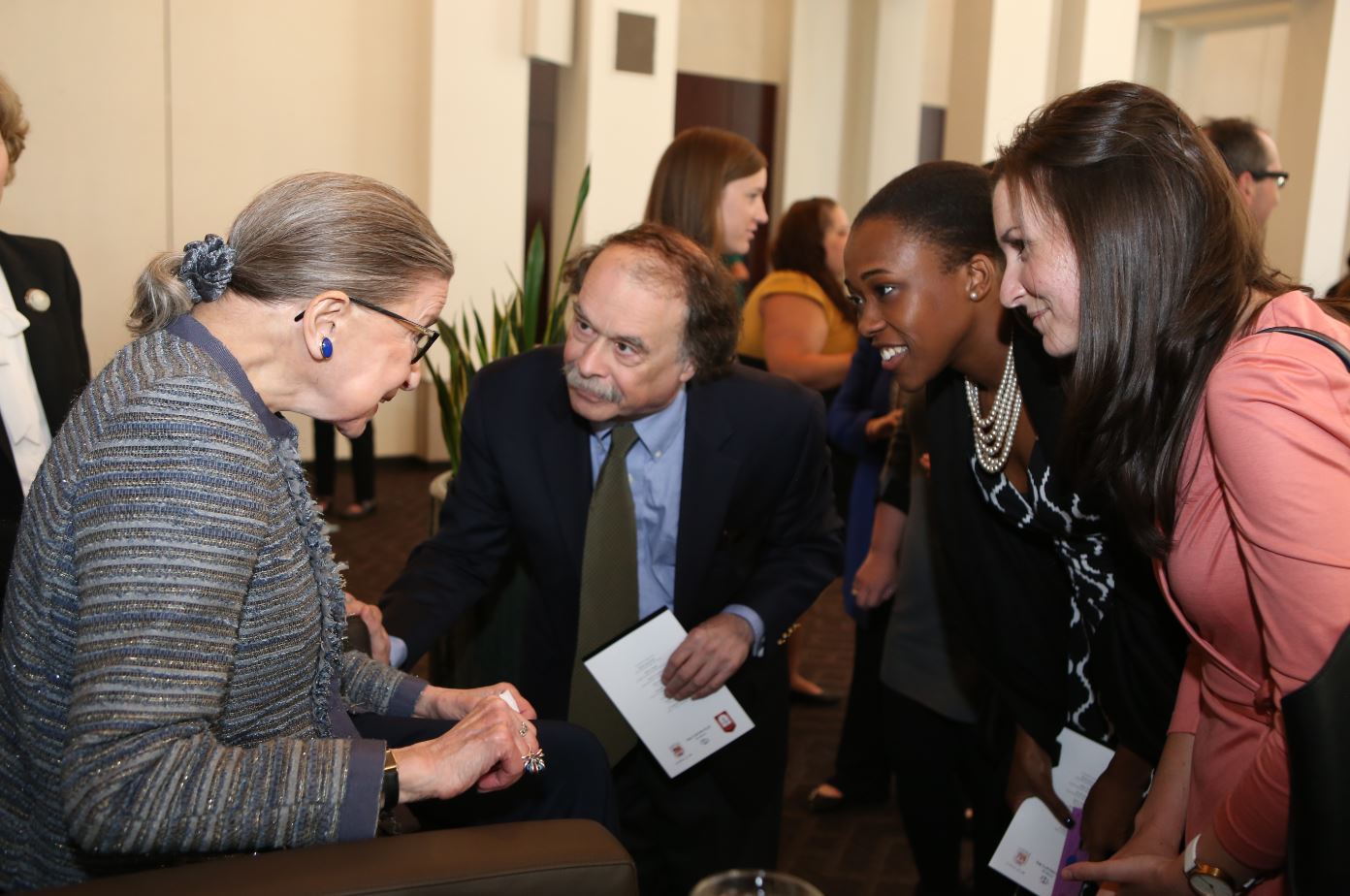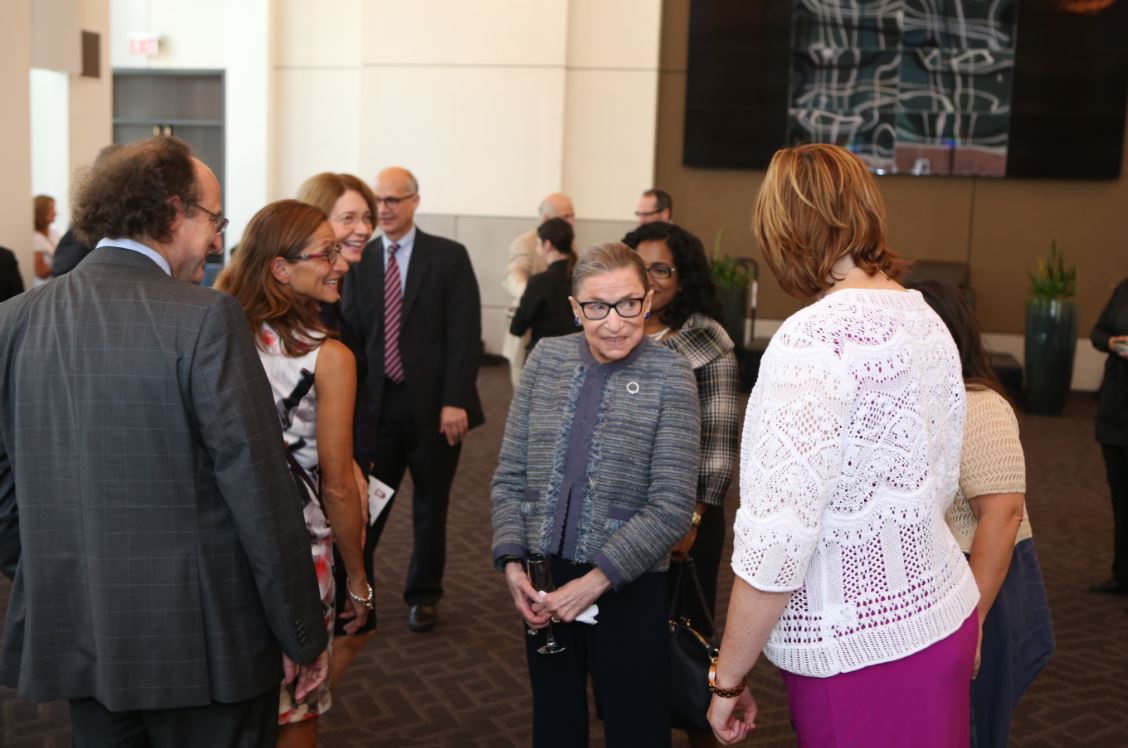


By Lauren P. Duncan, Law Bulletin staff writer
In the nearly 23 years that U.S. Supreme Court Justice Ruth Bader Ginsburg served alongside the late justice Antonin G. Scalia, the two often viewed cases from starkly different angles.
Having consistently different viewpoints didn’t prevent the two from sharing what Ginsburg described as an “enduring friendship” when she spoke at a tribute to Scalia Sunday in Chicago.
“I once asked how we could be friends given our disagreement on lots of things,” Ginsburg said. “Justice Scalia answered: “I attack ideas. I do not attack people. Some very good people have some very bad ideas.’”
That was one of several instances in which Ginsburg, by way of the late Scalia’s words, made the crowd laugh at the event hosted by The Lawyers Club of Chicago, The Catholic Lawyers Guild of Chicago and Loyola University Chicago School of Law.
She was joined in speaking at the event, held at the school’s Philip H. Corboy Law Center on Pearson Street, by 7th U.S. Circuit Court of Appeals Chief Judge Diane P. Wood and Judge Frank H. Easterbrook.
Before a crowd of lawyers, judges and Scalia friends and relatives, Ginsburg remarked about the unique relationship she shared with Scalia starting from the time they were both judges on the U.S. Court of Appeals for the District of Columbia Circuit.
She recalled an “indelible memory” from December 2000, after what she described as a “marathon” week in addressing the case of Bush v. Gore, it was no surprise to Ginsburg that she and Scalia came out on different sides of the argument — hers being in the minority.
She remembers him calling her at her chambers late one night after the case had been decided.
“He did not say, as he often did, ‘Get over it.’ He said, ‘Ruth, why are you still at the court? Go home and take a hot bath,’” she said.
Despite their different views, Scalia encouraged Ginsburg’s placement on the court, which she recounted as one of her “favorite Scalia stories.”
“When President Clinton was mulling over his first nomination to the Supreme Court, justice Scalia was asked a question to this effect: If you were stranded on a desert island with your new court colleague, who would you prefer, Larry Tribe or Mario Cuomo? Scalia answered, without hesitation, ‘Ruth Bader Ginsburg,’” she said.
That didn’t mean he cut Ginsburg slack, though. She said his “zinger” dissents to the majority opinions she was writing would strengthen the overall opinion.
“My final draft was more persuasive thanks to justice Scalia’s searing criticism. Indeed, whenever I wrote for the court and received a Scalia dissent, the majority opinion ultimately released was clearer and more convincing than my initial circulation,” she said. “Justice Scalia honed in on all of the soft spots and energized me to strengthen the court’s decision.”
“I miss the challenges and the laughter justice Scalia provoked; his pungent, eminently quotable opinions, so clearly stated that his words rarely slipped from the reader’s grasp; the roses he brought me on my birthday. … The court is a paler place without him,” she said.
The dynamic between the two justices was the subject of a 2015 comic-opera, “Scalia/Ginsburg,” which Ginsburg referenced in her remarks. She noted a duet the two “characters” sing, called “We are different, we are one.”
“Yes, different in our approach to comprehending written text but one in our respect and affections for each other and, above all, our reverence for the Constitution and the court. It was my tremendous good fortune to have known the purist justice Scalia as a working colleague and treasured friend,” she said.
While Ginsburg shared personal stories of her longtime friendship with Scalia, Easterbrook and Wood touched on his philosophy as a person and a judge.
Easterbrook first got to know Scalia when he was an assistant to the solicitor general in the 1970s while Scalia was assistant attorney general for the U.S. Department of Justice’s Office of Legal Counsel.
The two were later colleagues at the University of Chicago Law School, where Scalia taught from 1977 to 1982. The two then also went on to become members of the federal appellate bench.
Easterbrook recounted a story from Scalia’s days while working for the Justice Department when Scalia took issue with the basis of a report because, Easterbrook said, the “legal analysis in the report was all being made up.”
“Leaning back in his chair, puffing on his pipe — which was lawful in the Department of Justice — he repeated, ‘You’re making it all up, you’re just making it all up,’” Easterbrook said.
“The few words that Nino Scalia spoke in the attorney general’s conference room 40 years ago reflected the core of his jurisprudence and announced the path he was to take for the rest of his life, a path that requires all public officials to ground all of their decisions in texts adopted through the constitutional process,” Easterbrook said.
“He helped to transform the Supreme Court which today has embraced the textual approach. His influence will be missed there, but I will miss him even more as a friend.”
Wood, who also worked alongside Scalia as a faculty member of the University of Chicago, noted that Scalia’s career is known today for his strong views on certain issues, but she said she expects his opinions will have a lasting effect into the future.
“This was a person of tremendous commitment to the judiciary as we have seen both during the years he was on the court and thereafter, a person whose contribution is going to be difficult to measure in the short run, but obviously huge and we will see over the years, I think, continuing evidence of that,” Wood said. “It was my pleasure to be his friend and I am so glad he did spend the time he did in Chicago.”
Also in attendance Sunday were two of Scalia’s nine children, Ann Banaszewski, who lives in the Chicago area, and Eugene Scalia.
Eugene Scalia made a few remarks, thanking the organizations for hosting the tribute as another way for Scalia’s family to memorialize him.
“The public nature of his death has been a consolation to us as we’ve had opportunities for others to honor him,” Eugene Scalia said.
The event was organized under the leadership of Loyola’s Assistant Dean Jean M. Gaspardo, who became friends with Scalia after he taught at Loyola’s summer program in Rome in 2010 and again in 2015. She also got to know Ginsburg through the program, when she taught during the summer of 2009.
Gaspardo, a former president of the Catholic Lawyers Guild and an executive board member for the Lawyers Club of Chicago, said the two organizations and law school all have a deep respect for Scalia and were immediately on board with hosting the tribute to Scalia.
“We’re going to miss this giant who was part of the American judicial system,” she said.
Copyright © 2016 Law Bulletin Publishing Company. All rights reserved. Reprinted with permission from Law Bulletin Publishing Company
